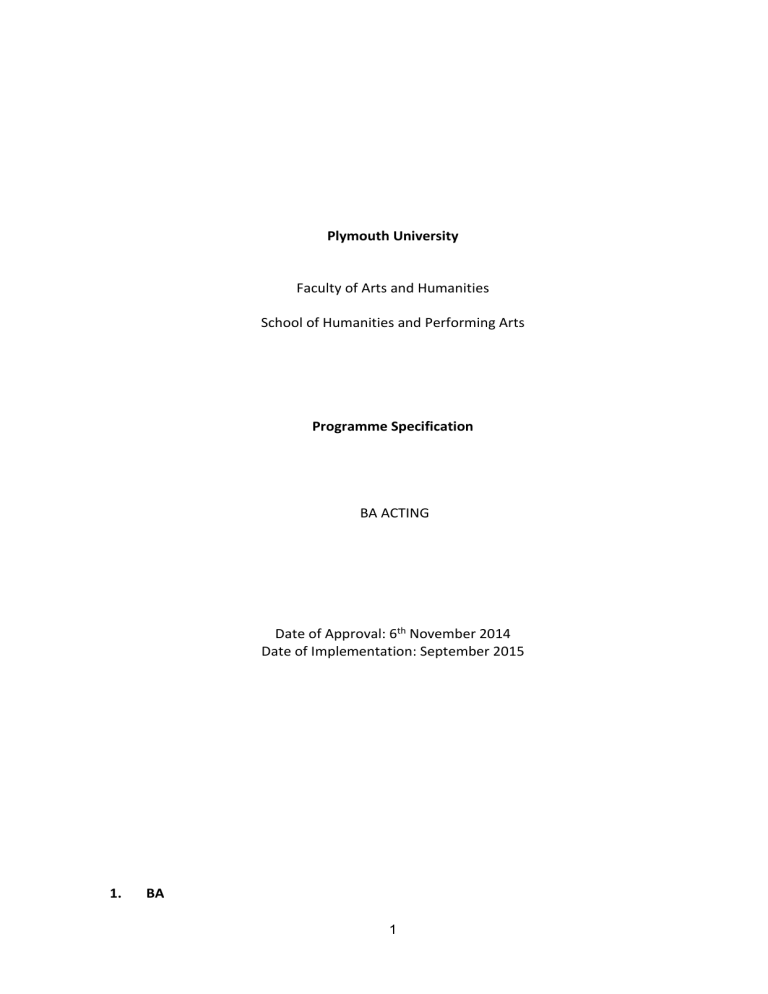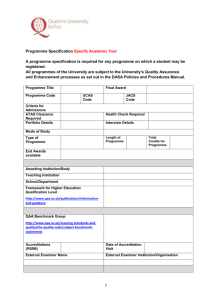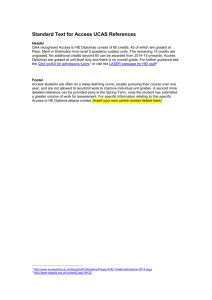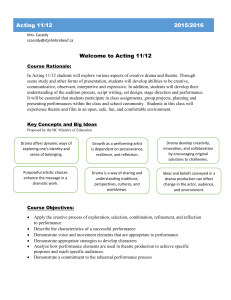BA Hons Acting 5222

1.
BA
Plymouth University
Faculty of Arts and Humanities
School of Humanities and Performing Arts
Programme Specification
BA ACTING
Date of Approval: 6 th November 2014
Date of Implementation: September 2015
1
Final award title
BA (Hons) Acting
Level 5 Intermediate award title(s)
Diploma in Higher Education
Level 6 Intermediate award title(s)
Ordinary Degree
UCAS code W411
JACS code W410
2.
Awarding Institution: Plymouth University
Teaching institution(s): Plymouth University
3.
Accrediting body(ies)
BA (Hons) ACTING is aligned with the ‘Hallmarks of Conservatoire Training’, which are required by Drama UK for accreditation (and listed below). The full criteria for accreditation is accessible at http://www.dramauk.co.uk/writeable/editor_uploads/files/DRAMAUK%20Accreditation
%20Guide%20June%202013%20%28new%20logo%29.pdf
BA (Hons) ACTING will seek ‘recognition’ within three years of enrolling, and
‘accreditation’ from Drama UK in 2020, or soon thereafter. Fully details of these commitments, the strategy and consideration are contained with Operational
Specification and Approval Document Template.
4.
Distinctive Features of the Programme and the Student Experience
Admission by two-stage audition process
30 plus contact hours per week
Teaching in the full accessible new performing arts centre, The House
2
Teaching from Theatre Royal creative staff (Staff Director and Resident Assistant
Director)
Teaching from resident companies (at The House)
Public performances
5.
Relevant QAA Subject Benchmark Group(s)
Dance, Drama & Performance (2007): http://www.qaa.ac.uk/Publications/InformationAndGuidance/Documents/DDP07.pdf
6.
Programme Structure
The traditionally accepted industry standard for vocational actor training programmes (as accredited by Drama UK) requires practical teaching in canonical acting techniques and methods, as well as engagement with a range of texts, including realist drama and lyrical verse. In consultation with the Artistic team at Theatre Royal, we recognise that industry now expects performers to be able to generate their own performance work and to contribute towards the devising and direction of theatre in rehearsal.
The programme structure of BA (Hons) ACTING responds to these traditional and emerging needs; each year is an iteration of a model encompassing technique-teaching, formal direction in production and the generation by students of their own performances.
The iterative model of training deepens experience through sustained engagement in these three core strands of an actor’s work: skills, production and generation.
YEAR 1
Introduction to Acting (skills)
Page to Stage 1 (production)
Performance Praxis (generation)
Plymouth Plus
Training for Actors 1 (skills)
Page to Stage 2 (skills)
YEAR 2
Page to Stage 3 (production)
Performance Practices (generation)
Training for Actors 2 (skills)
Training for Actors 3 (skills)
Making Theatre 1 (production)
Performance Lab 2 (generation)
3
YEAR 3
Training for Actors 4 (skills)
Optional module: either Performance, Culture and Society, or, Digital Performance
Practice, or, Advanced Performance Training (skills)
Performance Research (generation)
Making Theatre 2 (production)
4
BA (HONS) ACTING LEVEL 4
INTRODUCTION TO ACTING ACT404
(20 Credits)
FROM PAGE TO STAGE 1 ACT401 (20 Credits)
PAGE TO STAGE 2 ACT402
(20 Credits)
TRAINING FOR ACTORS 1 ACT403
(20 Credits)
5
BA (HONS) ACTING LEVEL 5
PAGE TO STAGE 3 ACT502 (20 Credits)
TRAINING FOR ACTORS 2 ACT503 (20 Credits)
TRAINING FOR ACTORS 3 ACT504 (20 Credits)
1
MAKING THEATRE 1 ACT501 (20 Credits)
BA (HONS) ACTING LEVEL 6
TRAINING FOR ACTORS 4 ACT603
(20 Credits)
MAKING THEATRE 2 ACT601 (40 Credits)
2
7.
Programme Aims
The aim of the Programme is to give experiences of the realisation of performance: of techniques, processes, methodologies and genres, and for these experiences to provide the basis for a lifelong engagement in the development and production of performance forms.
Graduates will meet the current needs of the creative industries, and also be equipped to redefine and refine these needs for the future as they work and develop as practitioners.
8.
Programme Intended Learning Outcomes (With QAA Benchmark mapping, see appendix: Dance, Drama & Performance Subject Benchmark Statements, 2007
8.1.
Knowledge and understanding
On successful completion graduates will have developed knowledge and understanding of:
1.
(KU 1) specific performance vocabularies, techniques, crafts, structures and key professional and creative working methods (7.13.4 QAA)
2.
(KU 2) key practitioners and practices and/or theorists and their cultural and/or historical contexts (7.12.2 QAA)
3.
(KU 3) cultural frameworks that surround performance events and on which these events impinge (7.13.6 QAA)
8.2. Cognitive and intellectual skills
On successful completion graduates will have developed:
1.
(CI 1) the ability to describe, interpret and analyse performance texts, production techniques and disciplines and performance events, using a range of specific strategies and methods (7.13.1 QAA)
2.
(CI 2) an intelligent engagement with the interplay between current practice and theory within the field of performance, and an understanding of the lineages of these ideas (7.12.6)
3.
(CI 3) an intelligent engagement with varied forms, practices, traditions, theories and histories of performance and theoretical explanations of these (7.12.1 QAA)
8.3. Key and transferable skills
On successful completion graduates will have developed the ability to:
1.
(KT 1) work individually and as part of a group to achieve objectives, to schedule
(7.14.3 QAA)
2.
(KT 2) engage in appropriate independent research (7.14.6 QAA)
3.
(KT 3) formulate ideas and express these to others in an appropriate form (7.14.1
QAA)
1
8.4. Employment related skills
On successful completion graduates will have developed:
1.
(E 1) understanding of the possibilities for performance implied by a text and/or score and abilities in realising these sources through performance, to a high standard (7.12.4 QAA)
2.
(E 2) ability to contribute to the creation and/or production of performance through a skilled practical understanding of appropriate performance (7.13.4 QAA) vocabularies, techniques, crafts, structures and working methods
3.
(E 3) competency in utilising representation to get employment and in generating, promoting and selling their own performance work. (7.14.7 QAA)
8.5. Practical skills
On successful completion graduates will have developed skills and proficiencies in:
1.
(P 1) interpreting texts and scores, and transitioning these from page to stage to produce a high, professional standard of performance (7.12.3 QAA)
2.
(P 2) utilising collective processes and the interplay between the performers' internal resources and the resources of the group in the realisation of performance (7.12.5 QAA)
3.
(P 3) processes of production, design and rehearsal by which performance is created, and have experience of their realisation and presentation in performance
(7.13.2 QAA)
9.
Admissions Criteria, including APCL, APEL and DAS arrangements
Admission will be by UCAS application and then by two-stage audition. Selection by audition is a key requirement of Drama UK accreditation and important to applicant/student perception of the degree as a valid professional training.
There will be no set UCAS points tariff for the programme, in line with the expectations of students (and Drama UK) of a vocational programme. Students will be advised that,
‘Offers for a place on BA (Hons) ACTING will be made following a rigorous, twostage audition process at The House Theatre. You will be assessed on your acting abilities, and your suitability for the programme through performance, workshop and interview. For further details of the audition process, and the required criteria please contact admissions on....'
As is common practice in this area, all applicants will be seen at audition.
Admission to the programme will be at level 4 (year 1) in all instances; there will be no transfer into levels 5 or 6 of the programme.
2
All applicants will receive an ‘audition pack’ including 5 monologues and 1 short scene from a play (n.b. in future years, we will move towards hosting this material online).
Applicants will be asked to select 2 monologues from the 5 and perform these, from memory at stage 1 audition. Applicants will be advised that stage 2, ‘call back’ auditions will require them to know all lines in the scene.
Students showing aptitude and potential for completing the course and sustaining a career in the creative industries as performers will be invited to a call back audition. At this audition students will workshop the scene received in the audition pack, taking direction and contributing creative ideas. Stage 2 auditions may involve Plymouth
University teaching staff, honorary doctorates (such as John Nettles OBE) and relevant
Theatre Royal staff, as per the arrangements outlined in Approval documentation.
In auditioning and interviewing potential students, we look for:
Essential evidence of a serious, ongoing commitment to an acting career in the professional theatre evidence of fluent written and spoken English (equiv to IELTS level 7.0) evidence of trainable vocal, physical and imaginative/emotional skills evidence of potential benefit from the study in acting offered at Plymouth evidence of an ability to understand, interpret and embody a dramatic text evidence of an ability to participate in group or ensemble situations.
Desirable an open, receptive and enquiring mind enthusiasm and readiness for rigorous work requiring sustained concentration a sense of language and rhythm, and the potential for identification with the thought process of a dramatic text the ability to portray and inhabit an imagined or fictional situation physical, vocal and imaginative/emotional skills with significant theatrical potential.
10.
Progression criteria for Final and Intermediate Awards
Students achieving a total of 120 credits will be entitled to receive a Certificate on Higher
Education. Students achieving a total of 240 credits (of which at least 120 are at level 5 or above) will be entitled to a Diploma of Higher Education. 320 credits (of which 80 are at level 6 and a further 120 at Level 5 or above) qualify a student for an Ordinary Degree.
360 credits will entitle the student to be awarded the BA (Hons) ACTING Degree.
11.
Exceptions to Regulations
There are no exceptions to regulations.
12.
Transitional Arrangements
3
There are not transitional arrangements
13.
Mapping and Appendices:
13.1.
ILO’s against Modules Mapping
See attached ‘Module Mapping’ document
13.2.
Assessment against Modules Mapping
See attached ‘Module Mapping’ document
13.3.
Skills against Modules Mapping
See attached ‘Module Mapping’ document
13.4.
Appendices
See attached CVs for full time teaching staff
See attached ‘MoU Theatre Royal Plymouth Uni’
Dance, Drama & Performance Subject Benchmark Statements, 2007
4






